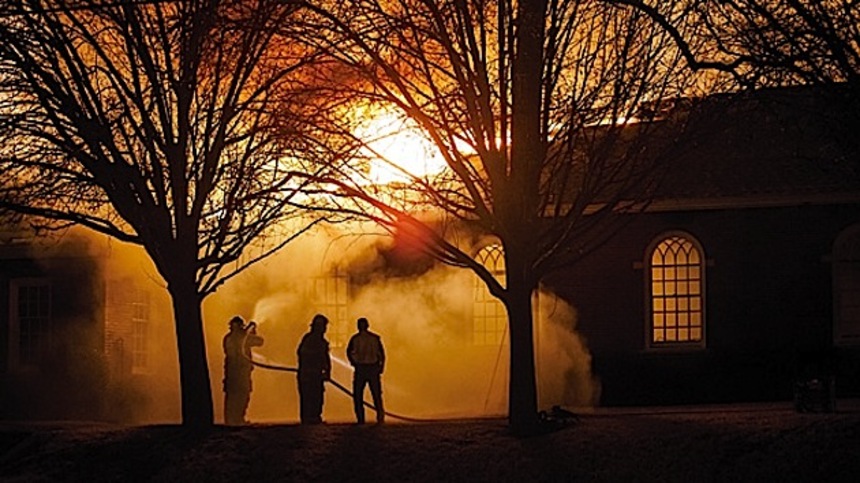Slamdance 2014 Review: LITTLE HOPE WAS ARSON Finds Forgivness In Darkness Alight

My point is that in relative filmmaking terms, it isn't hard to pick up a camera and make a documentary. It's a whole lot harder to make a good documentary; a documentary that breaks that pedantic or pedestrian altitude I feel so many can coast on. Perhaps this all sounds arrogant on my part, but it's where I stand.
Director Theo Love's look at the Smith County church fires of January 2010 has all the elements to get me nodding off or rolling my eyes at what I've claimed is limiting or unengaging form. The irony for me then is that in a film which is ultimately about forgiveness I am able to forgive the form for its shortcomings, applaud the humanist viewpoint, appreciate the content and value the message.
We begin on New Years Eve 2009 in Smith County East Texas, an area that's on the bible belt, or as one local states "right on the buckle." With 1,400 churches (many of them Baptist), there's one on just about every street corner.
What is assumed to be an accidental electrical fire at Little Hope, soon escalates into 10 whole churches being engulfed in flame over the next 3 weeks.
With communities in tatters and authorities perplexed on the who and the how, with no signifying motives or patterns, January is awash in mystery and frenzy. Soon enough churches are organizing camp outs; armed members at the ready to catch the culprits. Vengeance fuels some hearts for the burning of their buildings, while others state "The Church is the people."
Soon enough investigators are looking into two young men, Jason Bourque and Daniel McAlister, two best friends who grew up within these communities, who grew up in the church, held a faith that reverends and relatives found to be shining.
Love's lens then charts the boys' origins: of parents' drug habits, lost loves, depressions and eventual substance abuse themselves. Bourque and McAlister admit easily enough to their crimes, but their motives remain dubious for the black & white/good & evil kind of thinkers that populate their childhood communities.
McAlister left the church after the death of his mother by stroke. The next year he saved his own father from hanging himself. His belief in God remains, while his sentiment that the Church has turned its back on the less fortunate, focusing on needless materialism is strong. Bourque's feelings are far more taciturn though he is the more verbose of the two friends. Members of his community would most likely label his feelings as secular. He denies any exact memory of burning any of the 10 churches, claiming he was strung out of his mind on drugs, though one of the most heartbreaking moments in the film is when Bourgue talks of his dreams lost in mazes and flames. We can look at these two young men and call them apathetic perhaps, lost souls maybe, but it is clear that calling them monsters will get us nowhere.
What we have here is not a film that is seeking punishment nor wanting to sensationalize, nor undermine or discriminate a person's faith. Ultimately what Love shows us is that in the face of great anger, in the throes of confusion, and even in the loss of faith, a human resonance lays bare. Christianity becomes one vessel for forgiveness. It is the vessel for which many denizens of Smith County Texas choose to stay afloat on, but Little Hope Was Arson acts as no easy sermon. It's complexities run much deeper than such. For as we see townsfolk, family members, reverends and law enforcement officers draw lines, choose sides and mostly talk in the context of right or wrong, there is not one single person on camera who would not deny Bourque and McAlister forgiveness, who would not invite these two young men, now in prison for undoubtedly the rest of their lives, a chance to worship in the very churches they burned to the ground.
As the chroniclers then, Love and his small team get at something transcending the forms and aesthetics they're working under. Yes music swells, news footage is cross cut to emphasize the severity of these events, but maybe that all stems from the human heart, however maudlin at times, that's resonant and full of illuminating forgiveness. And that's, no doubt, a truth worth sharing on screen and off.
Little Hope Was Arson Trailer from Theo Love on Vimeo.

Do you feel this content is inappropriate or infringes upon your rights? Click here to report it, or see our DMCA policy.






